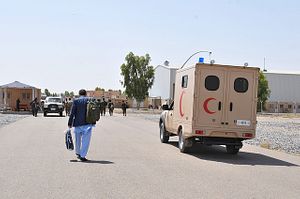On Monday, Watchlist — a New York-based coalition aimed at ending violations against children in armed conflict zones — called, for the first time, on the UN Secretary General to list the Afghan security forces as a party responsible for attacks on medical facilities in Afghanistan. The Secretary General is expected to release an annual report on children and armed conflict before summer and Watchlist’s report, based on research trips to Afghanistan in late 2016, urges the UN to call out Afghan government forces, in addition to Taliban and other insurgent groups, for targeting medical facilities.
Afghanistan’s public health challenges are astounding and exacerbated by a conflict that has increasingly moved into civilian spaces. According to Watchlist, from 2015 through 2016, “the number of people requiring health care and humanitarian aid has steadily increased, while access to heath care and humanitarian actors’ access to populations in need has declined.”
At the time of writing, at least 30 percent of Afghanistan’s population lacks access to basic health care. And 4.6 million people, including more than 2.3 million children, are in critical need of health care. However, at least 1.7 million people who require urgent medical care live in conflict-affected white areas where BPHS [basic public health service] coverage is limited, and in some areas absent entirely.
In 2016, the UN Assistance Mission in Afghanistan documented 119 conflict-related incidents targeting or impacting medical facilities and personnel. While the majority of incidents (95) were attributed to armed opposition groups, 23 were attributed to the Afghan National Defense and Security Forces.
“Targeted attacks on medical facilities have decimated Afghanistan’s fragile health system, preventing many civilians from accessing lifesaving care,” Christine Monaghan, a research officer at Watchlist, said. Monaghan traveled to Afghanistan in late 2016 to conduct field work for the report released today. “Children suffer as a result — we are seeing more deaths, injuries and the spread of disease.”
Perhaps the most prominent attack involving a medical facility and government and coalition forces was the devastating airstrike on a Doctors Without Borders (MSF) hospital in Kunduz in October 2015. Several months earlier, Afghan security forces had entered the facility in pursuit of an alleged Al Qaeda operative. According to MSF, three medical staff members were assaulted and three patients arrested — but after an hour the Afghan security forces let the three patients go and departed.
Another medical facility became a target for Taliban mortars in November 2015 because of the Afghan security forces occupying the building. According to Watchlist’s report, the facility was occupied by Afghan government forces until February 2016 and remained closed after due to nearby fighting.
The list of violations goes on: Taliban intimidating and threatening clinic workers and Afghan government forces looting supplies from a hospital in Kunduz; Islamic State affiliates forcibly closing medical facilities in Nangarhar; Afghan security forces entering a hospital in Maidan Wadrak and warning staff not to treat insurgents.
From 2015 through 2016, Watchlist says the war in Afghanistan has increasingly targeted health care facilities and personnel, leading to “ significantly more children directly injured and suffering from acute malnutrition, diarrheal disease, and vaccine-preventable diseases (e.g. polio and measles).”
According to the World Health Organization, the number of Afghan children suffering from malnutrition increased more than 40 percent between early 2015 and the close of 2016. “Communicable diseases are also up; WHO reported 169 measles outbreaks in 2015, an increase of 141 percent from 2014. The United Nations Assistance Mission in Afghanistan (UNAMA) furthermore reported that child casualties increased by 24 percent from 2015 to 2016.”
As the war in Afghanistan drags on, the most vulnerable continue to suffer greatly. Watchlist’s report calls on all the parties to the conflict to cease attacks on medical facilities, urging the Afghan government in particular to “remedy impunity for violations of international law relating to the protection of medical care in armed conflict.”
In Afghanistan, the Watchlist report notes, “medical personnel are on the front lines of the conflict.”

































